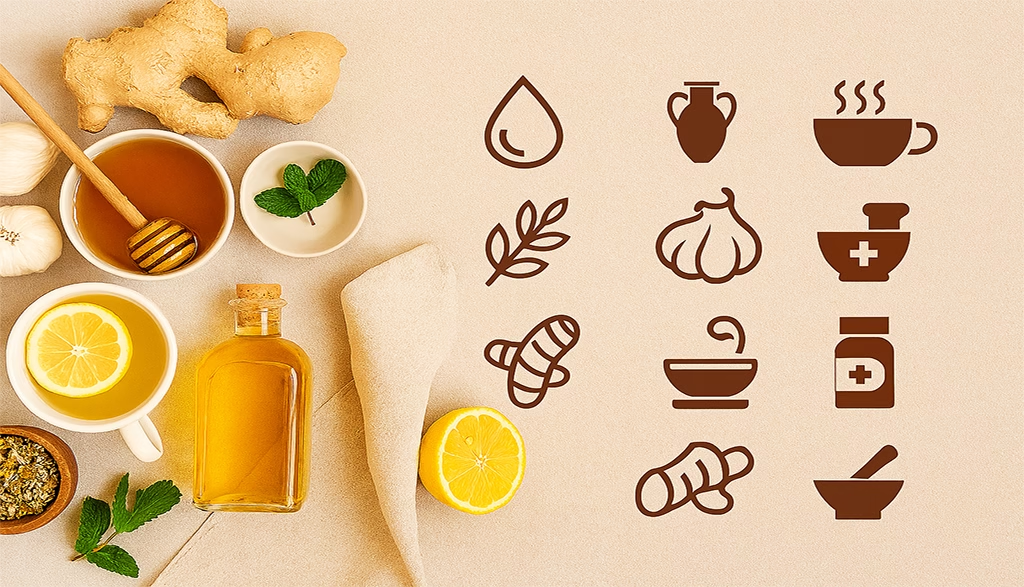Reading Time: 3 minutes
Content
Home Remedies
In a world dominated by quick diagnostics and modern medicine, the timeless value of home remedies still holds strong. These simple, natural approaches go beyond old traditions—they represent care, grounded in ancestral wisdom and everyday habits. As a form of preventive care, they encourage us to pay attention, take action early, and respect the body before it tips into illness.
Prevention Begins at Home
Health is not merely the absence of disease; it is the presence of balance. And balance begins with awareness. Home remedies encourage us to observe our bodies closely responding to fatigue with rest, to digestive discomfort with herbal teas, and to stress with calming rituals. By integrating these practices into our routines, we shift from reactive treatment to proactive care.
Moreover, prevention is not a single act but a lifestyle. Drinking warm water in the morning, stretching gently, and choosing nourishing foods are all preventive gestures. They may seem small, but over time, they build resilience. In this way, home remedies become daily companions—quiet, consistent, and deeply effective.
Nature’s Pharmacy: Simple Ingredients, Profound Impact
The power of home remedies lies in their simplicity. Garlic, for instance, is a natural antibiotic and cardiovascular protector. Ginger aids digestion and reduces inflammation. Honey soothes the throat and supports immunity. Chamomile calms the nervous system and promotes restful sleep.
These ingredients are not only effective—they are symbolic. They connect us to the earth, to tradition, and to the wisdom of generations past. Unlike synthetic medications, which often isolate and concentrate, home remedies embrace the whole: the plant, the ritual, the intention.
Rituals That Heal Before Harm
Preventive medicine is not just about avoiding illness—it’s about cultivating vitality. Home remedies teach us to act early, to intervene gently, and to trust the body’s signals. A steam inhalation at the first sign of congestion, a turmeric tonic during seasonal shifts, or a saltwater gargle after a long day of speaking—these are not cures, but shields.
Furthermore, these rituals foster mindfulness. They slow us down. They ask us to prepare, to pause, and to participate in our own healing. In doing so, they transform health from a clinical concept into a personal, sacred practice.
Empowerment Through Accessibility
One of the greatest strengths of home remedies is their accessibility. They do not require prescriptions, appointments, or insurance. They are available in kitchens, gardens, and local markets. This democratization of care empowers individuals and communities to take charge of their health.
Additionally, home remedies promote sustainability. They reduce dependence on industrial pharmaceuticals and encourage the use of renewable, biodegradable resources. In this way, they support not only personal well-being but also planetary health.
Returning to the Roots
In conclusion, home remedies are more than alternative treatments—they are preventive medicine in its purest form. They remind us that healing begins long before symptoms appear. They invite us to return to the roots: to nature, to tradition, and to ourselves.
By embracing these practices, we honor the wisdom of our ancestors, the intelligence of our bodies, and the rhythm of life itself. In a world that often seeks quick fixes, home remedies offer something deeper: a slow, steady path to lasting wellness.
The Natural Memo was created to guide readers back to a time when natural ingredients were the solution, not just a trendy term. Over time, it expanded to cover education and other topics where a natural approach is fitting. Yesterday, while walking my dog, I met a Dominican Creole who shared stories about home remedies, inspiring me to write an entire series on this subject. Many articles will follow this one, and I promise to personally try the home remedies I promote. This article serves as just an introduction.




